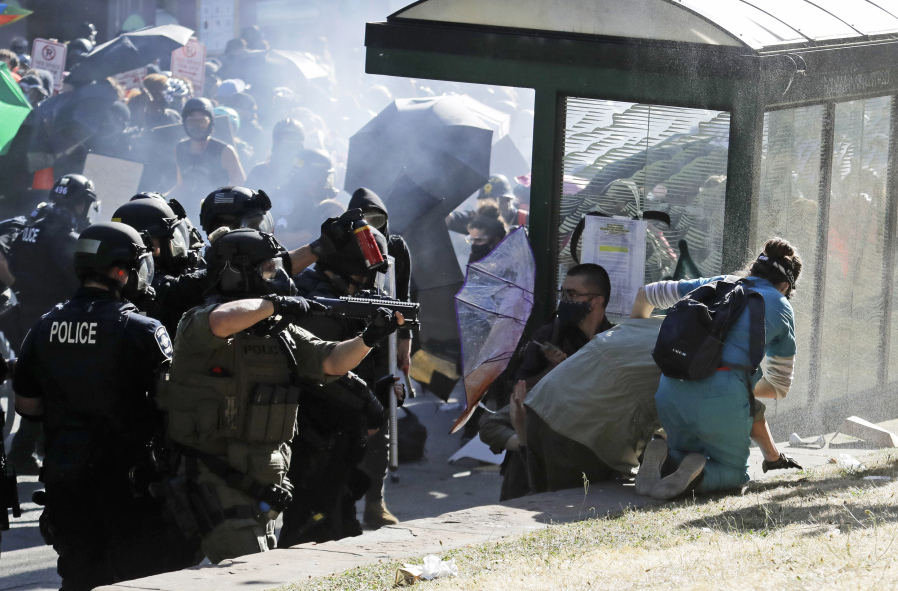SEATTLE — The city of Seattle has agreed to pay $10 million to settle a lawsuit from a group of demonstrators injured by police during the 2020 uprising in protest of George Floyd’s murder.
The lawsuit, filed in King County Superior Court nearly three years ago, had cost the city millions of dollars in defense and expert witness fees, according to the Seattle law firm of Stritmatter Kessler Koehler Moore, which represented the protesters.
Among the 50 plaintiffs were a woman who had a heart attack when she was struck in the chest by an SPD blast ball, a man who was hospitalized in a coma after his arrest and a veteran who uses a cane and was “gassed and tackled because he didn’t retreat fast enough,” according to the attorneys.
Others included a teenager whose finger was partially blown off by a blast ball and “dozens of others who suffered permanent hearing loss, broken bones, concussion, wounds, bruising and emotional damage” at the hands of Seattle officers, the plaintiffs’ lawyers said.
City Attorney Ann Davison said the settlement “was the best financial decision for the City considering risk, cost, and insurance.”
“The case has been a significant drain on the time and resources of the City and would have continued to be so through an estimated three-month trial that was scheduled to begin in May,” she said in a statement, noting the settlement involves no city admission of wrongdoing.
Davison said that in defending the lawsuit, her office reviewed hundreds of interactions between protesters and police, including more than 10,000 videos and more than a million pages of records.
The city had argued that protesters “assumed the risk” of being injured by police when they chose to exercise their First Amendment rights to peacefully protest, an argument rejected by Judge Sandra Widlan, according to court records. According to lead plaintiff’s attorney Karen Kohler, the protesters “were engaged in a First Amendment speech and activity against the very police brutality which they were met with.”
The Seattle Police Department has been sharply criticized for its violent and over-the-top response to the protests stemming from Floyd’s May 2020 murder by Minneapolis police. SPD’s protest response resulted in a federal judge finding officers had used excessive force and violated the free-speech rights of thousands of residents who legally gathered to demonstrate against Floyd’s murder and institutional and police racism.
Seattle officers indiscriminately deployed tear gas, blast balls and pepper spray into crowds of mostly peaceful protesters. Officers were criticized for targeting the entire crowd, rather than vandals who were using the protests to damage or destroy property, including burning police cars. A deep-dive Office of Inspector General review of SPD actions during the protests showed repeated systemic breakdowns in department discipline and command structure, as well as a lack of accountability.
Kohler said evidence gathered by the plaintiffs showed police “dehumanized” protesters and responded with violence toward them at the “smallest provocation or suspicion.” She said evidence showed police violated numerous policies and allowed officers to use weapons they were not trained to deploy.
Officers are required to fill out a form when they use force during an arrest, and Kohler said “hundreds” of these reports were “cut and pasted together months later and rubber-stamped” by the department.
Kohler said the city also sought to compel the plaintiffs to attend involuntary psychiatric and medical examinations.
Kohler cited other incidents, including an elaborate hoax perpetrated by the department to scare protesters into thinking armed members of the Proud Boys extremist group were in the area. In another protest at the headquarters of the Seattle Police Officers Guild, officers played music through speakers while they broke up the crowd.
Kohler said the city hired as an expert University of Liverpool Professor Clifford Stott, who’s considered among the world’s foremost crowd policing experts. Stott reportedly concluded that, particularly during the early days of the Seattle protests, he had not seen the level of violent aggression by police against unarmed protesters “in any democratic state.”
Longtime Seattle civil rights attorney Lem Howell, who was hired as an expert by the plaintiffs, concluded the city responded with the “tactics and weapons of war” against a citizenry that was protesting what he called Seattle’s “long history of racially discriminatory policing.”
The settlement comes on the heels of the city’s $2.9 million settlement last year of a lawsuit filed by business owners on Capitol Hill who claimed the city’s handling of the protests — including the formation of a police-free Capitol Hill Organized Protest zone — damaged their businesses.



